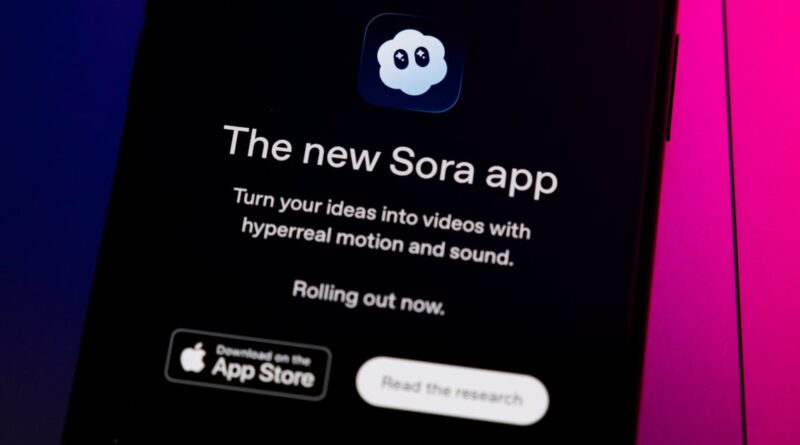Excitement — and concerns — over OpenAI’s Sora 2 and other AI video tools
The next frontier of online video further blurs the line between human- and AI-generated content.
In late September, Meta CEO Mark Zuckerberg announced “Vibes,” a feature that allows users to create and watch AI-generated videos. ChatGPT maker OpenAI quickly followed with the launch of Sora 2, which people can use to create videos with “cameos” of themselves, friends and others who grant permission. Despite only being available by invitation, the new tool promptly jumped to the top of Apple’s app store.
The apps are part of a burgeoning family of AI tools that make it far easier for non-experts to create sophisticated videos, including hyperrealistic or fantastical content
“You’re only limited by your imagination,” Hany Farid, a professor of electrical engineering and computer sciences at UC Berkeley, told CBS News.
In unveiling Sora 2, for example, OpenAI showed how simple prompts such as “a man rides a horse which is on another horse” or “figure skater performs a triple axle with a cat on her head” are used to create quirky, and convincing, videos.
Beyond offering a creative outlet, the tools also represent a new era for social media, with Sora 2 and Meta’s “Vibes” offering a TikTok-like experience. The main difference: The videos users scroll are all AI-generated.
Adam Nemeroff, an assistant provost and technology expert at Quinnipiac University, thinks Meta is planning for AI content generated through Vibes to eventually co-exist in users’ feeds with human-made videos. “I would imagine that would be the case, because Meta is in the business of attention.”
Nemeroff also expects big tech players to eventually try to monetize AI-generated content through advertisements and brand placements.
Farid noted that, despite the enormous growth of generative AI tools like ChatGPT, Anthropic’s Claude and Google’s Gemini, tech companies are still refining how to churn out profits from the rapid adoption of artificial intelligence.
OpenAI has said it plans to give Sora 2 users the option to “pay some amount to generate an extra video if there’s too much demand relative to available compute.”
Slop in the face?
The emergence of AI-created videos is heightening concerns about a potential flood of low-quality “AI slop,” including “deepfake” content that could be mistaken as real. Meta, for instance, allows users to cross-post “Vibes” videos on other platforms, such as Facebook Stories.
“They’re the kinds of things that you can kind of distract from other more reputable or better information from a quality standpoint,” Nemeroff said. “But they’re often popping up next to the same things in the same places.”
A page on OpenAI’s website details some of the measures the company has taken with Sora 2 to limit the production of potentially harmful content and to help users distinguish AI content. “Every video generated with Sora includes both visible and invisible provenance signals,” according to the company.
OpenAI and Meta did not respond to requests for comment on what steps they are taking to ensure the apps are used safely.
Disruption is messy
Experts say advancements in AI-generated videos portend major changes for the entertainment industry and other online content players.
“Anybody with a keyboard and internet connection will be able to create a video of anybody saying or doing anything they want,” Farid said.
That shift will be messy, with movie and TV industry professionals already insisting on industry guardrails to ensure AI doesn’t encroach on their livelihood. One immediate concerns for the industry is that Sora 2, which lets content creators use clips of copyrighted characters, initially appeared to put the burden of enforcing those rights on copyright holders.
“Since Sora 2’s release, videos that infringe our members’ films, shows and characters have proliferated on OpenAI’s service and across social media,” Charles Rivkin, chairman and CEO of the Motion Pictures Association, said in a statement on Tuesday. “While OpenAI clarified it will ‘soon’ offer rightsholders more control over character generation, they must acknowledge it remains their responsibility – not rightsholders’ – to prevent infringement on the Sora 2 service. OpenAI needs to take immediate and decisive action to address this issue.”
In another recent controversy over the use of AI, Dutch producer and comedian Eline Van der Velden recently sparked backlash in Hollywood after she unveiled an AI-generated actress. The Screen Actors Guild responded by saying that “creativity is, and should remain, human-centered.”
“I think there’s a disruption coming, and there will be some destruction and some creation,” Farid said. “And I think it’s coming for more than just the movie and music industry — it’s coming for a lot of industries.”





